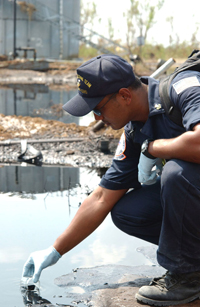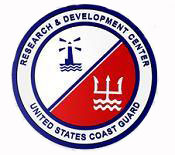Protection of Natural Resources
 Through
our Protection of Natural Resources goal, we contribute to the national
well-being by shielding our ecologically rich and sensitive marine environment.
The Coast Guard's role in environmental protection dates back more than
175 years to the 1822 Timber Act that tasked the Revenue Cutter Service
with protecting government timber from poachers. The Coast Guard is still
protecting the country's valuable natural marine resources. Today, however,
the principal dangers are overfishing and foreign poaching. In the fight
to protect the biomass within the U.S. Exclusive Economic Zone, the Coast
Guard is working on numerous fronts--e.g. patrolling the closed fishing
grounds off New England so that depleted species have an opportunity to
return to harvestable levels. Through close cooperation with other federal
and foreign agencies, the Coast Guard also is gaining ground against the
illegal use of high-seas driftnets in the Pacific Ocean. Coast Guard cutters
remain on constant patrol in the Bering Sea to prevent foreign vessels from
poaching in the fish-rich Alaskan waters.
Through
our Protection of Natural Resources goal, we contribute to the national
well-being by shielding our ecologically rich and sensitive marine environment.
The Coast Guard's role in environmental protection dates back more than
175 years to the 1822 Timber Act that tasked the Revenue Cutter Service
with protecting government timber from poachers. The Coast Guard is still
protecting the country's valuable natural marine resources. Today, however,
the principal dangers are overfishing and foreign poaching. In the fight
to protect the biomass within the U.S. Exclusive Economic Zone, the Coast
Guard is working on numerous fronts--e.g. patrolling the closed fishing
grounds off New England so that depleted species have an opportunity to
return to harvestable levels. Through close cooperation with other federal
and foreign agencies, the Coast Guard also is gaining ground against the
illegal use of high-seas driftnets in the Pacific Ocean. Coast Guard cutters
remain on constant patrol in the Bering Sea to prevent foreign vessels from
poaching in the fish-rich Alaskan waters.
The Coast Guard is also playing an increasingly important role in the nation’s efforts to protect its threatened and endangered species. In the Gulf of Mexico, the Coast Guard helps protect endangered sea turtles from being caught in indiscriminate fishing nets. Along the Atlantic coast, Coast Guard units help free endangered northern right whales that have become entangled in fishing gear. In Hawaii, Coast Guard buoy tenders remove tons of marine debris from the coral reef habitat of the Hawaiian monk seal. From patrolling Steller sea lion rookeries in Alaska to enforcing manatee speed zones in Florida, the Coast Guard plays a vital role in helping the nation recover and maintain healthy populations of marine protected species.
 The
Coast Guard also has pioneered the fight against water pollution. Its Research
and Development Center developed a technique to "fingerprint"
oil to identify the source of a spill. Today, the Coast Guard's National
Strike Teams are on-call 24 hours a day to respond to accidents and spills
in the marine environment. The service also enforces federal regulations
to reduce the dumping of refuse and sewage from vessels of all types. Through
a public education program called Sea Partners, the Coast Guard is promoting
the importance of a clean marine environment and is, in addition, working
closely with foreign nations and international agencies to reduce the number
of marine accidents (and resulting spills) by establishing and rigorously
enforcing improved safety standards for commercial vessels and their crews.
The
Coast Guard also has pioneered the fight against water pollution. Its Research
and Development Center developed a technique to "fingerprint"
oil to identify the source of a spill. Today, the Coast Guard's National
Strike Teams are on-call 24 hours a day to respond to accidents and spills
in the marine environment. The service also enforces federal regulations
to reduce the dumping of refuse and sewage from vessels of all types. Through
a public education program called Sea Partners, the Coast Guard is promoting
the importance of a clean marine environment and is, in addition, working
closely with foreign nations and international agencies to reduce the number
of marine accidents (and resulting spills) by establishing and rigorously
enforcing improved safety standards for commercial vessels and their crews.
To reach the longer-term goal of virtually eliminating environmental damage to U.S. waterways, the Coast Guard pursues an aggressive three-pronged approach encompassing prevention, enforcement, and response. The service has partnered with the maritime industry to develop new safety standards for commercial vessels and their crews, and enforces those standards through rigorous testing and thorough investigations into marine accidents and spills.
Marine and Environmental Science:
http://www.uscg.mil/hq/cg5/Living Marine Resource Protection:
http://www.uscg.mil/hq/g-o/g-opl/LMR/LMR.htmForeign Vessel Inspections:
http://www.uscg.mil/hq/g-m/nmc/standards/Marine Pollution Education, Prevention, Response, and Enforcement:
http://www.uscg.mil/vrp/

